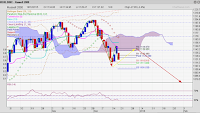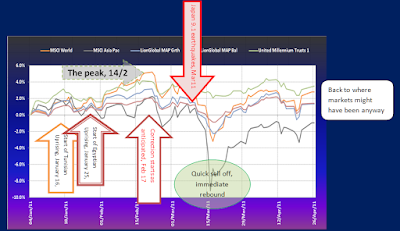2015 - The Mid-Year Turn
Ramblings at the Summer Solstice
Traditionalists tell us that financial markets are supposed to go into a summer slump around this time of the year. But they don't because algorithms and computers are running the show. Computers don't need summer holidays, don't suffer burnouts, - and are easily replaced.
I attended a famous trading platform's seminar recently, where they still teach you that, essentially, we investors are stupid and that we can't keep up with these nano computer machines. One speaker claims that Goldman Sachs would never risk more than about $40 million on any given trading day (don't know where this figure came from). With a capitalisation of $92 billion (source: finance.yahoo, June 2015), this is a ridiculously low amount. If I wanted to apply this ratio to my trading account, I would die of starvation, (assuming I wanted to live of the profits.).
They also want to make you think that investing is a simple matter, no need for indicators, - just react to the prices, find and follow the trend, your friend. For too many, investing still is a game, and - it's ok when the real professionals walk away with their money.
What seriously worries me is the manner in which huge returns expectations are created in the inexperienced investor mind, by introducing him to highly volatile trades. At the same time they tell him to control his risks by adjusting the size of his stake! Getting back to the Goldman Sachs example, in terms of size of investment, these guys hardly take any risk. Even then, they have access to some of the most sophisticated analysis money can buy. If they go to such length to secure their investments why tell everybody else to - just go with the flow? Oh yeah, and don't trust your emotions, or your luck, they add.
I once stated arrogantly in a podium discussion that we, the entire community of investors, don't know enough about the markets to be able to predict an outcome accurately. I earned a lot of cold stares. No one came to say, "Rainer, I appreciate your honesty". Well I was arrogant, not honest. We can never know all that is necessary to predict market outcomes with 100% certainty!
But I am adamant that the more we study and observe financial markets the closer we can arrive at a conclusion where we can at least predict likely outcomes, as long as markets are not deliberately manipulated. The problem is the closer we come to getting it right, the more jealously many proponents guard their knowledge, and that includes spreading false information which sends the competition on a wild goose chase...
In my previous career, I made huge efforts to educate and enthuse about the benefits of learning about what drives financial markets beyond the fundamental stories that are often associated with outcomes, regardless of their causal significance. But because it does not sell, it never became terribly popular. Too few are prepared to learn. Rather they wait to be served on a silver platter, and spoon-fed. They only respond when they see the selling point!
Alas, few will be able to take on face value what has been taught. how can they validate the principles and concepts, the right use of building blocks and investment tools, the risk and its implications on their personal circumstances, when they lack the basics? That is why I want to open up the playing field and offer slices of insight into markets and investment strategies to a wider audience.
The next six months are - different?
Drawbacks we know of
In the medium term, investors should be aware of the following drawbacks that could derail the equity rally, upset bond holders and surprise forex punters (as if they needed more...):
- Market volatility levels are at their lowest in a decade. They can only go higher?
- Huge liquidity has delivered a disproportionate price surge in many assets. How 'real' are current valuations?
- The consequences of a widely announced interest rate increase in the USA is not fully appreciated, let alone factored into current pricing.
- The currency war is still raging, and cannot be won by a single nation or currency. Who is going to stop it? The one who accepts the need to some sort of return to a "gold standard" or similar.
- Greece, Russia, Ukraine, Middle East, China, Africa - anyone of them could become a trigger for a long overdue correction: it is not what the fundamentals are in relation to the market price that counts, it is what investors reckon, prices should be when viewed from their particular vantage point.
Market rallies continue still...
There are also a lot of positive factors that keep the markets moving:- Many Asia Pacific equity markets have yet to match returns in the developed world this year, with a few notable exceptions.
- China's economic slowdown creates sustainability, and political reforms promise many commercial benefits.The recent introduction of greater foreign access to 'A' shares ("Shanghai - Hong Kong Connect") has resulted in huge rallies and raised hopes of long term benefits.
- Japan's Abenomics have created the biggest buzz in the NIKKEI 225 for investors. There are long term benefits in store.
- India's equity values may have overshot the mark earlier this year, but the reforms of Mr Modi will bring major benefits for India's economy in the next few years.
- Europe is still at the earliest stage of recovery, and, hopefully aided by the new open ended liquidity, has much to offer, now that the EUR is as low as it is. EUR investors have a home advantage (=no currency risk).
- Although expensive, USA stocks still rule the roost, with an extra boost for foreign investors from the strong US dollar. Just be mindful that this strength could soften short term.
- As for US investors, they have plenty of opportunities to buy into foreign markets at a super discount, thanks to the high USD.
Main Aspect: Evolving Markets, Changing Perspectives
All the above points could turn out to be a trigger for a market move into the opposite direction (=down!) when our views of them change. There is no room for static strategies, no matter the time frame you invest in.
But that is no excuse to stop looking for a likely outcome!
My research focuses on market cycles and technical analysis. This research suggests that we should see
- some immediate (from 15th June) upside in equities of Europe, parts of Asia , Australia and in US tech stocks;
- the USD soften a bit, which may give rise to a little rally in gold prices, though unlikely beyond $1245 an ounce;
- volatility levels increase rather than calm down.
Where to invest now?
The emphasis may be on large and mid-cap stocks, high yield bonds in US and Europe and even a rebound in lower risk bonds. Generally it is rather risky to hold sovereign (investment grade) bonds during this period, as bond prices, too, are suffering bouts of high volatility. The key to choosing bonds is their term-to-maturity or duration: the shorter the term, the lesser the ensuing volatility when interest rates start to impact.
The third quarter is likely to show greater volatility in stocks, bonds and commodities but be a little calmer with respect to currencies. By end of September, we might still finish in positive territory overall.
The most likely turning point in the second half
We must prepare for a break down in the rally by late September.To qualify that further: in quite a few markets, the highs for 2015 may be already in (India for example), or are imminent (China/Japan?), while some markets will lag and reach their peaks as late as September (Australia). The main difficulty (or advantage - depending on your ability to strategise) is that markets are not displaying the typical correlation we have come to expect. I.e. you won't see "America sneeze and Asia get pneumonia" during the third quarter. Instead, we might see US indices enact side-way moves,changing directions several times, tilting mildly upward, while Asian and especially European shares rally to new highs as US monies invest outside of US.
Sour Grapes in the 4th Quarter?
For the fourth quarter, my indicators are exhibiting erratic moves. That for me means, it's time to reduce my exposure to risk, which does extend even to many bond types. I might end up with some currency pairs as the only meaningful 'long' positions. Still, the USD may hold its strong position as a quality investment, possibly as a direct result of punters repositioning for a rise in US interest rates.



Comments